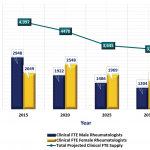Dr. Craig says available support staff resources, including nurses and administrative help, at a practice are also attractive draws.
Make It Work
For practices restricted by geographic location, staff support and community amenities, strategies for recruitment are combined with creative approaches to ensure patient access to care.
Suzanne Gharib, MD, a rheumatologist in private practice in Charleston, W.Va., admits the odds of recruiting new physicians to private practice in her region are unfavorable. “Many hospitals in our area compete to recruit physicians. And even the university, [which] can offer positions with lucrative compensation packages, is having difficulty with recruitment.”
With only 15 practicing rheumatologists in the state, patient demand in W.Va. is outpacing the physician supply. This fact means Dr. Gharib and her colleagues work longer hours to see more patients. And each patient requires extra time to complete administrative work to manage insurance requirements, such as securing authorization for medication coverage. Given the rural setting of the state, many of these patients also travel two to three hours one way to visit a clinic, which complicates scheduling.
Two strategies are helping Dr. Gharib’s practice meet patient demands:
- Employing more mid-level support: By providing extra training to nurse practitioners and physician assistants, these mid-level staff members can see patients independently. Dr. Gharib and her practice colleagues are considering hiring a mid-level staff support person to fill the space currently open for an additional physician; and
- Coordinating with primary care physicians: After a recent meeting with a large primary care group in her area, Dr. Gharib and her colleagues are contemplating how primary care can provide a higher level of support to patients with low-acuity rheumatic conditions who can be managed in primary care.
“For us, a shortage of physicians means we must work together to establish plans for care that meet the needs of all patients, including those patients with severe disease, to ensure workforce issues don’t negatively [affect] patient wellbeing,” Dr. Gharib says.
Carina Stanton is a freelance science writer in Denver.
Reference
- ACR Committee on Training and Workforce Issues. 2015 workforce study of rheumatology specialists in the United States. ACR. 2015.
Resource
Learn more about rheumatology workforce research and discussion.


